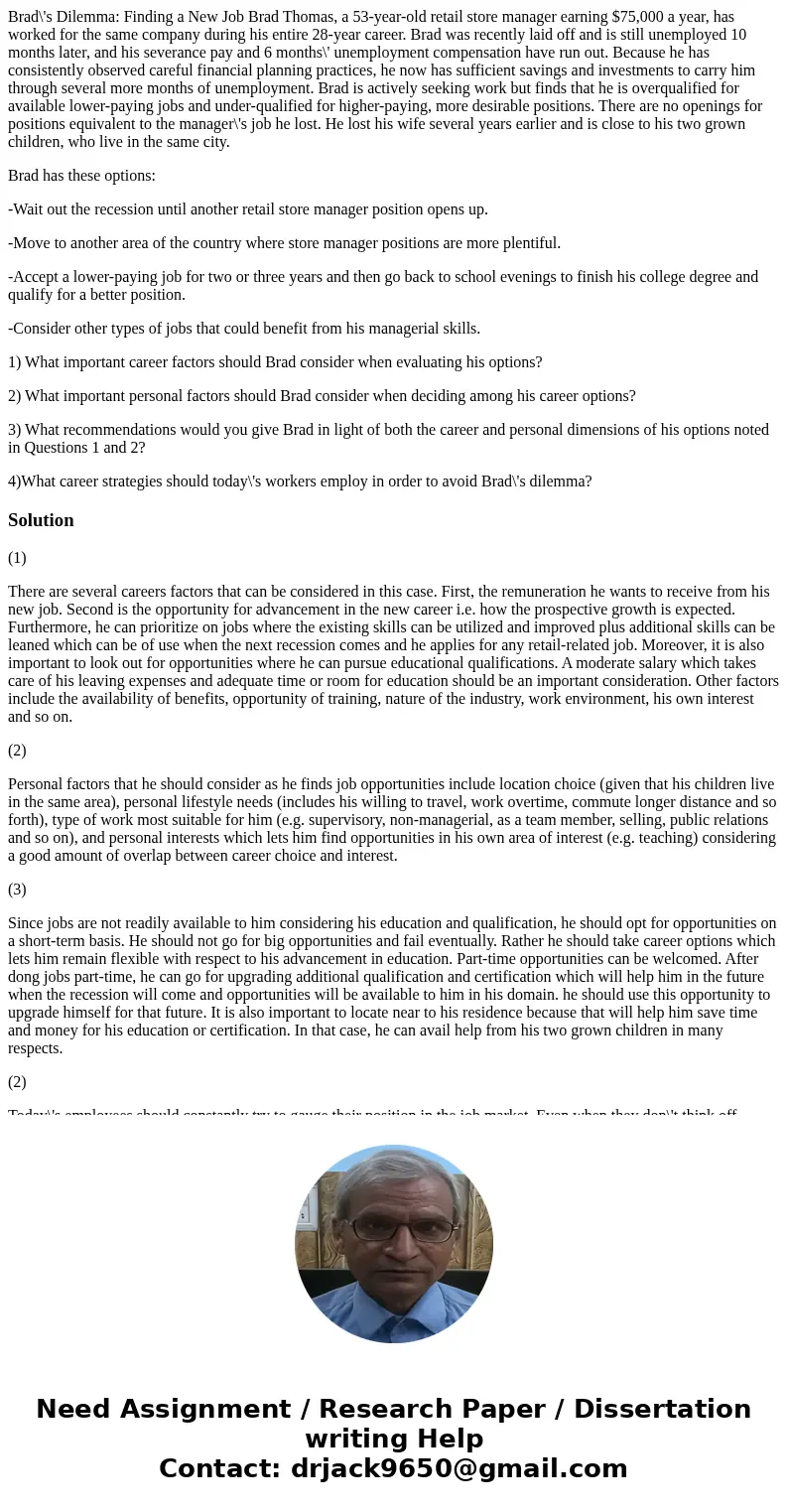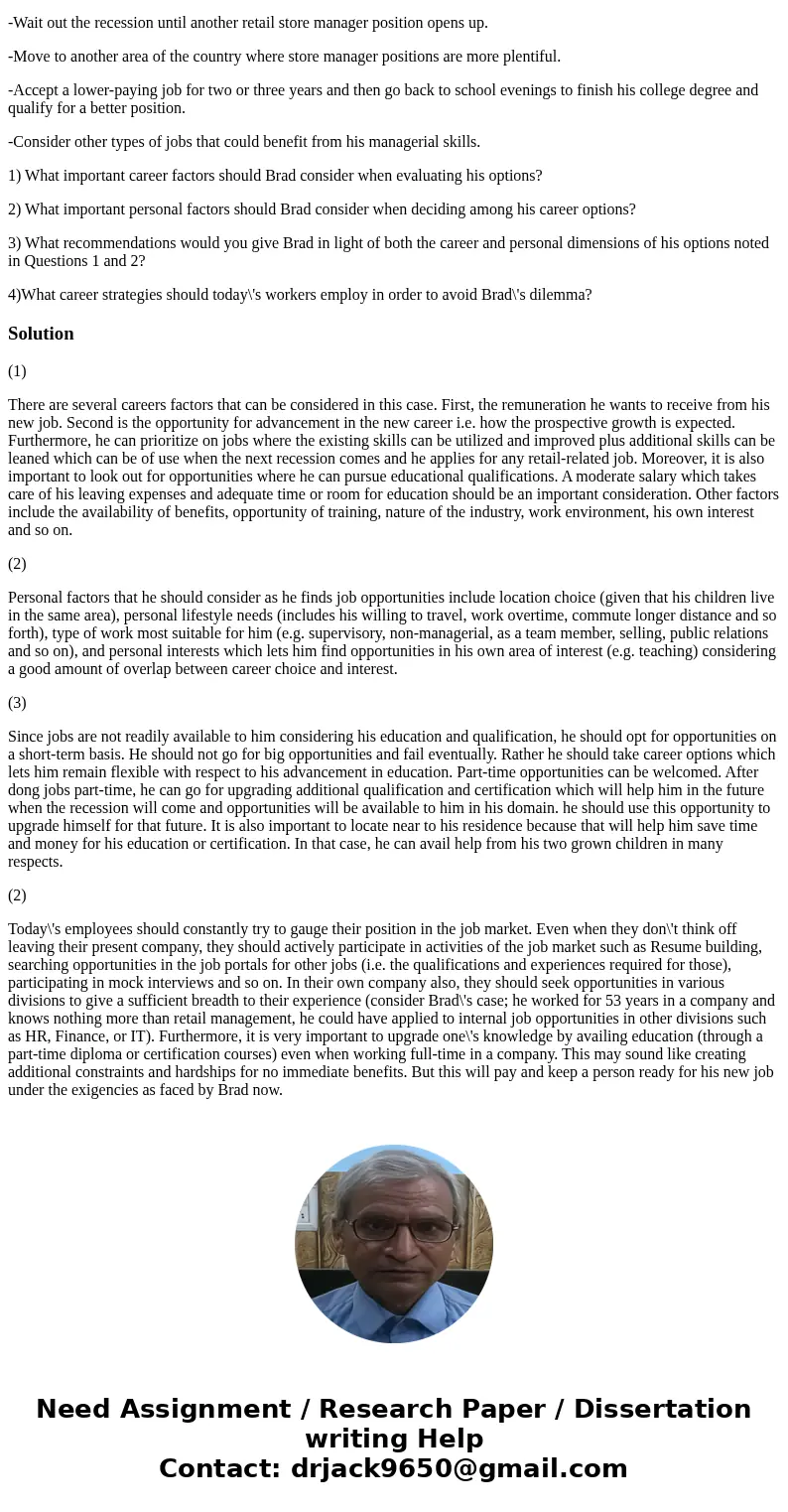Brads Dilemma Finding a New Job Brad Thomas a 53yearold reta
Brad\'s Dilemma: Finding a New Job Brad Thomas, a 53-year-old retail store manager earning $75,000 a year, has worked for the same company during his entire 28-year career. Brad was recently laid off and is still unemployed 10 months later, and his severance pay and 6 months\' unemployment compensation have run out. Because he has consistently observed careful financial planning practices, he now has sufficient savings and investments to carry him through several more months of unemployment. Brad is actively seeking work but finds that he is overqualified for available lower-paying jobs and under-qualified for higher-paying, more desirable positions. There are no openings for positions equivalent to the manager\'s job he lost. He lost his wife several years earlier and is close to his two grown children, who live in the same city.
Brad has these options:
-Wait out the recession until another retail store manager position opens up.
-Move to another area of the country where store manager positions are more plentiful.
-Accept a lower-paying job for two or three years and then go back to school evenings to finish his college degree and qualify for a better position.
-Consider other types of jobs that could benefit from his managerial skills.
1) What important career factors should Brad consider when evaluating his options?
2) What important personal factors should Brad consider when deciding among his career options?
3) What recommendations would you give Brad in light of both the career and personal dimensions of his options noted in Questions 1 and 2?
4)What career strategies should today\'s workers employ in order to avoid Brad\'s dilemma?
Solution
(1)
There are several careers factors that can be considered in this case. First, the remuneration he wants to receive from his new job. Second is the opportunity for advancement in the new career i.e. how the prospective growth is expected. Furthermore, he can prioritize on jobs where the existing skills can be utilized and improved plus additional skills can be leaned which can be of use when the next recession comes and he applies for any retail-related job. Moreover, it is also important to look out for opportunities where he can pursue educational qualifications. A moderate salary which takes care of his leaving expenses and adequate time or room for education should be an important consideration. Other factors include the availability of benefits, opportunity of training, nature of the industry, work environment, his own interest and so on.
(2)
Personal factors that he should consider as he finds job opportunities include location choice (given that his children live in the same area), personal lifestyle needs (includes his willing to travel, work overtime, commute longer distance and so forth), type of work most suitable for him (e.g. supervisory, non-managerial, as a team member, selling, public relations and so on), and personal interests which lets him find opportunities in his own area of interest (e.g. teaching) considering a good amount of overlap between career choice and interest.
(3)
Since jobs are not readily available to him considering his education and qualification, he should opt for opportunities on a short-term basis. He should not go for big opportunities and fail eventually. Rather he should take career options which lets him remain flexible with respect to his advancement in education. Part-time opportunities can be welcomed. After dong jobs part-time, he can go for upgrading additional qualification and certification which will help him in the future when the recession will come and opportunities will be available to him in his domain. he should use this opportunity to upgrade himself for that future. It is also important to locate near to his residence because that will help him save time and money for his education or certification. In that case, he can avail help from his two grown children in many respects.
(2)
Today\'s employees should constantly try to gauge their position in the job market. Even when they don\'t think off leaving their present company, they should actively participate in activities of the job market such as Resume building, searching opportunities in the job portals for other jobs (i.e. the qualifications and experiences required for those), participating in mock interviews and so on. In their own company also, they should seek opportunities in various divisions to give a sufficient breadth to their experience (consider Brad\'s case; he worked for 53 years in a company and knows nothing more than retail management, he could have applied to internal job opportunities in other divisions such as HR, Finance, or IT). Furthermore, it is very important to upgrade one\'s knowledge by availing education (through a part-time diploma or certification courses) even when working full-time in a company. This may sound like creating additional constraints and hardships for no immediate benefits. But this will pay and keep a person ready for his new job under the exigencies as faced by Brad now.


 Homework Sourse
Homework Sourse